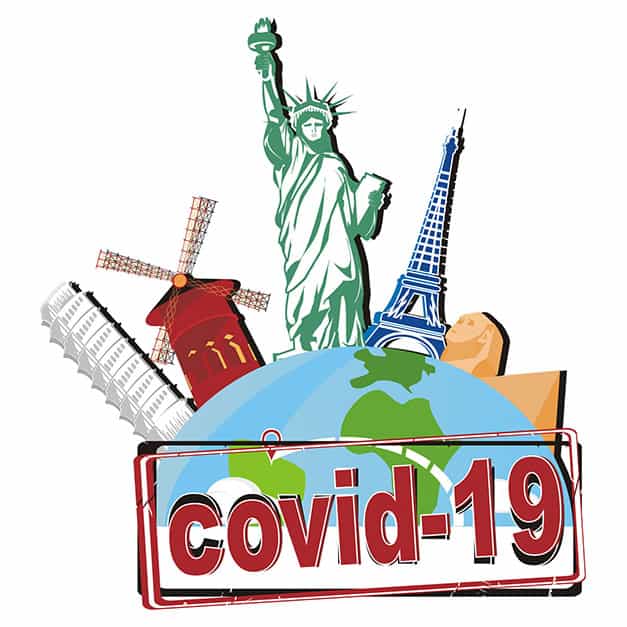
05 May 2020 Covid-19 Travel Update for International Intended Parents: Building New Pathways
Travel Issues for International Intended Parents and Babies Born to U.S. Surrogates During Covid-19: Building New Pathways Where None Existed Before
Our IFLG team has been working non-stop since the covid-19 pandemic hit, and I’m happy to report that, so far, we have been successful in helping intended parents from other parts of the world get here safely for their babies’ births and/or return home safely with their new families. Most of those we’ve helped have been our existing surrogacy clients, although we have been proud to help those who simply needed help with their travels as well. The countries involved include France, Germany, Italy, Spain, Portugal, Switzerland, Monaco, UK, Ireland, Belgium, Czech Republic, Israel, Saudi Arabia, Egypt, United Arab Emirates, New Zealand, Australia, Singapore, Japan, Taiwan, and China.
Since the sudden worldwide disruption of daily life caused by the coronavirus covid-19 outbreak earlier this year, the carefully laid plans of intended parents, surrogates, donors, agencies and fertility physicians have been thrown into disarray. Intended parents from outside the U.S. planning to be present at their baby’s birth in the U.S. faced cancelled flights or even indefinite travel bans. Visas and ESTAs (Electronic System for Travel Authorizations allowing visitors to travel to the United States under the Visa Waiver) were abruptly cancelled. Adding to parents’ heartbreak of possibly being unable to welcome their babies into the world was the very real concern about who would care for their babies after birth until the parents were able to get here, as well as guardianship and insurance issues for the newborns. On top of all that, many international intended parents who had traveled to the U.S. for the birth of their children have found themselves stranded, unable to get their babies home when the U.S. State Department ceased expedited processing of newborn passports for all but a life-or-death emergency, as certified by a doctor.
Of course, these potentially life-endangering dilemmas were the unintended consequences of public health agency and government actions to protect human life and stop the spread of the virus. Likely no one in the position of having to implement these public safety measures thought about what would happen to the baby just born to a surrogate, who would now be potentially stranded alone in a foreign country with parents unable to travel. But in the United States, the sudden travel bans, the U.S. State Department closure of non-essential offices, and the moratorium on passports left intended parents with few options.
I’m proud to say that fertility professionals and non-profit advocacy organizations all over the world have stepped up quickly to address the problems and answer questions for those caught up in this unprecedented crisis. IFLG partner Molly O’Brien and I have participated in a number of webinars for intended parents with experts from all over the world (available in our multi-media archive of covid-19 resources).
All of us have had to rise to the occasion and find new pathways where none existed before.
To help intended parents get to the U.S. for their babies’ births, our new process in the era of covid-19 is to start with the U.S. embassy or consulate nearest the intended parents’ home. Typically, we help the client prepare a file or dossier of documents to establish the parents’ qualification for one or more of the very limited exceptions to the travel bans outlined in the Presidential Proclamation. These may include an attorney letter and a physician’s letter confirming the fertilization process, the surrogacy arrangement, the parent-child relationship and the argument(s) for why their travel to care for their child is in the national interest of the United States. Through this process, the intended parents have succeeded in having their visas or ESTAs reinstated, or, in some cases, they have received special visas to travel for the birth.
Getting the babies born to surrogates in the U.S. back to their home countries: Prior to the covid-19 pandemic, international intended parents would typically apply to the U.S. State Department for an expedited passport (typically issued in three to five business days) to take their newborn back home. However, in response to the covid-19 pandemic, the U.S. State Department has temporarily ceased processing expedited passports, except for doctor-certified life-and-death circumstances.
Here, too, we have had to help parents find a new path. Currently, our IFLG team works with attorneys in the intended parents’ home countries to obtain travel documents issued by the home country to bring the babies home. Sometimes this is a passport from the home country (which were previously not available until the family had returned home, and often months later), laissez-passer travel documents (laissez-passer is French for “let pass”), or emergency travel documents (ETDs) from the home country (usually only valid for the flight home). Prior to the covid-19 pandemic, these travel document solutions were never applied to surrogacy matters. Perhaps these new solutions can be a glimpse of the future. Out of chaos, compassion and grace often thrive in abundance.
The covid-19 emergency and its impact on international travel have required an extraordinary level of planning and preparation of intended parents, surrogates, physicians and attorneys. But having helped thousands of intended parents and surrogates navigate the long, arduous journey to parenthood—having witnessed their resilience, commitment and determination—I have no doubt our ART community will overcome whatever obstacles nature and bureaucracy can throw at us.
If you or someone you know is having difficulty with international travel for surrogacy during the pandemic or during any current (or future) covid-19 travel bans, please feel free to contact us. For more resources and information about assisted reproduction and surrogacy during covid-19, visit our covid-19 resource center.

















